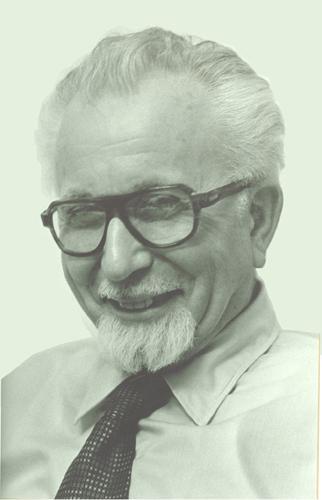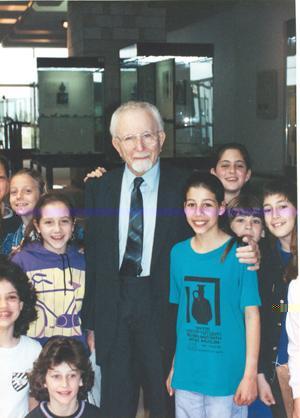 Dr. Reuben HechtBorn in Antwerp, Belgium in 1909, Dr. Hecht grew up in Basel, Switzerland, where he served as a group leader in the 'Blau-Weiss' youth movement. Between 1928 and 1933, he studied at the Universities of Munich, Berlin, and Heidelberg and took part in the activities of K.J.V., Zionist academic fraternities. In 1933, he graduated from Heidelberg University with a Ph.D. in political science. In addition to his professional field, he also studied archaeology, art history, ancient history, natural science, drama, and journalism. His interest in collecting archaeological finds and art developed hand in hand with his enthusiasm for Zionism, and the two interests remained interrelated all his life.
Dr. Reuben HechtBorn in Antwerp, Belgium in 1909, Dr. Hecht grew up in Basel, Switzerland, where he served as a group leader in the 'Blau-Weiss' youth movement. Between 1928 and 1933, he studied at the Universities of Munich, Berlin, and Heidelberg and took part in the activities of K.J.V., Zionist academic fraternities. In 1933, he graduated from Heidelberg University with a Ph.D. in political science. In addition to his professional field, he also studied archaeology, art history, ancient history, natural science, drama, and journalism. His interest in collecting archaeological finds and art developed hand in hand with his enthusiasm for Zionism, and the two interests remained interrelated all his life.
At the beginning of the 20th century the Hecht family founded the Neptun-Rhenania Concern, operating shipping lines and services along the inland waterways of the Rhine, Main, and Neckar. The family enterprise was Dr. Hecht’s initiation into the world of business and he remained active in this economic center throughout his life.
In 1936, Dr. Hecht immigrated to Palestine, and in 1939 ‘Etzel’ (the Revisionist Movement) sent him to Europe. He opened an 'Aliya-Beth ' (illegal immigration to Palestine) office in Zurich and in Paris, represented ‘Etzel’ in a number of countries, and was also active in the world Revisionist organization ‘Zohar’ and the newly founded 'Hazach.' During and after World War II, Dr. Hecht was involved in numerous rescue operations in Western Europe. Dr. Hecht with kids in the museumDr. Hecht returned to Israel immediately after the proclamation of the State. Soon after, he proposed to the Provisional Government the idea of building grain silos in the harbors of Israel. He obtained a government concession in 1950 and established Dagon Batey Mamguroth Le-Israel Ltd. In 1981 he also erected Mamguroth Ashdod.
Dr. Hecht with kids in the museumDr. Hecht returned to Israel immediately after the proclamation of the State. Soon after, he proposed to the Provisional Government the idea of building grain silos in the harbors of Israel. He obtained a government concession in 1950 and established Dagon Batey Mamguroth Le-Israel Ltd. In 1981 he also erected Mamguroth Ashdod.
Dr. Hecht served as a personal adviser to Prime Ministers Menachem Begin and Yitzhak Shamir, each of whom he accompanied on official missions and journeys to North America, Europe, and Egypt, where he conveyed and explained Israeli policies.
From the time of the establishment of the State of Israel, Dr. Hecht served on numerous official committees dealing with art and culture, such as the Permanent Committee for the Design of Bank Notes, Coins, and Commemorative Medals of the Bank of Israel, the State Archaeological Council, and the Public Council for Culture and Art attached to the Israeli Ministry of Education and Culture. Dr. Hecht was a co-founder of the University of Haifa and a member of its Board of Governors and Executive Committee until his death in 1993. In 1973 he established the Herzl Institute for Research and Study of Zionism and in 1974 the Reuben Hecht Chair in Zionism. In 1984 he established, at the University of Haifa, the Reuben and Edith Hecht Museum. Dr. Hecht received the first Honorary Doctorate conferred by the University of Haifa.
Dr. Hecht was awarded numerous awards for his economic, social, and cultural activities, among others the B'nai B'rith International Humanitarianism Award in 1986, and perhaps the most distinguished, the Israel Prize for Exemplary Lifetime Service to the Society and State in 1984.
Dr. Hecht passed away in 1993 and is buried in the 'Etzel' and 'Lehi' section of the Haifa cemetery.

